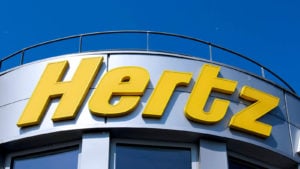Consumer discretionary stocks represent a product or service that someone may want, but doesn’t need. We’re talking about everything from retailers to restaurants and sources of entertainment. If the products are great, these stocks tend to do well. But if there are better options, then these are consumer discretionary stocks to sell.
After all, consumers are usually in the buying mood over the holidays. But the names on this list have been down in the dumps for a while, and their earnings reports, revenue growth (or lack thereof) and analyst sentiment leave something to be desired. That’s why the names on this list are getting low ratings in the Portfolio Grader.
This is an ideal time to do housecleaning to eliminate these low-rated consumer discretionary stocks. By doing so before the end of the year, you can take advantage of the capital losses to offset potential gains elsewhere in your portfolio. Why not lower your tax bill?
By dumping these stocks, you’ll have more opportunities to pick up some winning names that have a better chance to grow your portfolio.
ChargePoint Holdings (CHPT)

ChargePoint Holdings (NYSE:CHPT) isn’t just one of the worst consumer discretionary stocks out there. In my opinion, it’s one of the worst stocks on all of Wall Street.
If you’re a ChargePoint bull, you can only hope that a new CEO will figure out a way to turn things around at some point. ChargePoint announced in November that Chief Operating Officer Rick Wilmer would take the CEO job, as longtime CEO Pasquale Romano transitioned to an advisory role.
I don’t have a lot of optimism in that regard. The electric vehicle charging company lost $158.2 million in the fiscal third quarter of 2024, an increase from $84.5 million a year ago.
Today you can get ChargePoint stock for less than $2.50, falling 74% in 2023. It gets an “F” rating in the Portfolio Grader.
Mullen Automotive (MULN)

I’ve made no secret of my distaste for Mullen Automotive (NASDAQ:MULN) in the past. I don’t have anything against the people who work there, I just think the evidence proves that Mullen is a bad stock that’s more likely to go to zero than make you a hero.
Management has been trying to make a go of it. The electric vehicle manufacturer is trying to keep the stock price over $1 to maintain Nasdaq compliance. It completed a 1-for-25 reverse stock split in May and a 1-for-9 reverse split in August.
But that hasn’t helped at all because even after all that, shares trade for about 12 cents each.
Now Mullen is trying it again. A special meeting of shareholders today could give the board permission to do another reverse split in a ratio between 1-for-2 and 1-for-100.
Considering Mullen’s track record, a higher number will probably be required if Mullen is going to go over $1 per share for a solid month. This stock has been falling so fast that the board can’t keep up.
Mullen stock is down 98% this year and gets an “F” rating in the Portfolio Grader.
Penn Entertainment (PENN)

Penn Entertainment (NASDAQ:PENN) is a company in serious transition. Best known for its place in legalized gambling, Penn has more than 40 casinos, racetracks in North America, and more than 50,000 gaming machines.
But its failed partnership with Barstool Sports put the biggest shadow on Penn. It bought 36% of Barstool in 2020, and then went all-in in February 2023 by acquiring the rest of the company. In all, Penn Entertainment spent $550 million on Barstool.
But the company wasn’t a good fit after all, and that’s an expensive mistake to make after spending more than two years in a partnership. Earlier this year, Penn sold Barstool back to its founder, Dave Portnoy, for just $1.
Ouch.
Penn is going the wrong way. Revenues in the third quarter were $1.61 million, down from $1.62 million a year ago. The company also posted a net loss of $725.1 million for the quarter. That wasn’t a big surprise considering that Penn had projected a pre-tax non-cash loss between $800 million and $850 million for the quarter related to the disposal of the business.
PENN stock is down 14% this year and gets an “F” rating in the Portfolio Grader.
Flexible Solutions International (FSI)

Flexible Solutions International (NYSEAMERICAN:FSI) is a Canadian company that aims to help farmers increase crop yields, reduce water use and lower their carbon footprint.
The company makes biodegradable polymers and water evaporation products, and management hopes that interest in carbon-neutral solutions and water conservation will bring a greater market for its nitrogen conservation and evaporation control products.
That’s an admirable mission. But as a shareholder, it’s not a profitable one.
Revenue in the third quarter was only $8.72 million, down from $11.68 million a year ago. The company posted a loss of $284,000 a year after making a profit of $1.66 million.
“This was a very poor quarter,” CEO Daniel O’Brien said. “We are not losing customers, but certain customers are ordering much less as they confront difficult conditions in their markets.”
Now FSI is in cost-cutting mode, looking to reduce operating costs and tighten the budget in expectation of continued weakness in the fourth quarter and in 2024.
FSI, which has a market cap of only $19 million, is down nearly 50% this year. It gets an “F” rating in the Portfolio Grader.
Dish Network (DISH)

I have to wonder if the executives at Dish Network (NASDAQ:DISH) feel the same way that Blockbuster’s C-suite felt when they realized that the world was passing them by.
Blockbuster was once the dominant video rental company in the U.S., but then Netflix (NASDAQ:NFLX) came along and made it irrelevant. Why go to the video store when you can just receive a movie in your mailbox?
Of course, times change quickly and even Netflix recently scrapped its video-by-mail service. Streaming services are all the rage, and that’s leaving traditional cable companies and Dish Network behind.
True, at one point Dish was seen as revolutionary. Put a little satellite dish on your roof and pow! You can get TV entertainment without cable!
But now Dish is just trying to keep up, and not doing well. It branched out into the streaming space through its Sling TV service, but that’s not going well either. Sling TV subscribers in the third quarter totaled 2.12 million, down from 2.41 million a year ago.
Pay TV subscribers were down from 10.01 million a year ago to 8.84 million now. Dish TV subscribers fell from 7.6 million to 6.7 million.
Not surprisingly, revenue fell from $3.93 billion a year ago to $3.58 billion in the third quarter of this year. DISH stock is down 68% this year and gets an “F” rating in the Portfolio Grader.
Southwest Airlines (LUV)

Southwest Airlines (NYSE:LUV) is one of the consumer discretionary stocks to dump while you can. Unlike its competitors, LUV is underperforming, showing a loss of 13% in stock price in 2023 while the other majors are all comfortably in the black.
Part of the problem is fuel costs. When fuel prices are up, so are Southwest’s costs. Fuel costs have been a major drag on the company until recently, and subsequently, all of the major airlines have been on the rise in the last 30 days.
But that hasn’t been enough to get Southwest out of the red. Even though revenue in the third quarter was $6.5 billion, up 4.9% from a year ago, Southwest’s revenue per available seat mile (RASM) was down 6.8%. Southwest expects that trend to continue in the fourth quarter, as it forecasts RASM to be down 9% to 11% from a year ago.
Overall operating expenses, which include labor costs, were up 10% from a year ago to $6.4 billion – almost completely eating up quarterly revenue.
If you want to buy an airline stock, look elsewhere than Southwest. LUV stock gets an “F” rating in the Portfolio Grader.
Hertz Global Holdings (HTZ)

Hertz Global Holdings (NASDAQ:HTZ) is a vehicle leasing company, operating the Hertz brand as well as Dollar Rent a Car, Firefly Car Rental and Thrifty Car Rental.
Granted, the company is in much better shape than just a few years ago. It struggled to survive during and after the Covid-19 pandemic, filing for bankruptcy in 2020. But after getting an infusion of $5.9 billion in capital and reducing its debt load, Hertz emerged in 2021.
And the company even posted record revenue in the third quarter of $2.7 billion, up 8% from a year ago. GAAP net income of $629 million was up 9% from a year ago.
But Wall Street is not impressed. HTZ stock actually dropped after that earnings report because earnings didn’t meet analysts’ expectations. The company’s adjusted income was $230 million, or 70 cents per share. But analysts had expected 76 cents per share there. And the adjusted income was far below the $410 million that Hertz posted a year ago.
Hertz is improved in the long term, but it’s still not a good investment and it’s had a rough 2023 overall. The stock is down 38% this year and it earns an “F” rating in the Portfolio Grader.
On the date of publication, neither Louis Navellier nor the InvestorPlace Research Staff member primarily responsible for this article held (either directly or indirectly) any positions in the securities mentioned in this article.
